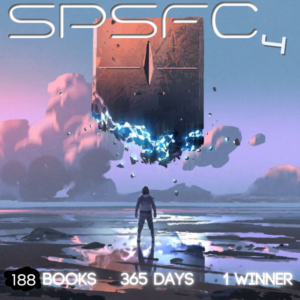
It’s been a bit quiet with updates lately, but my judging team for the fourth annual Self-Published Science Fiction Competition (SPSFC4) has been hard at work reading the 32 books initially assigned to us. By the end of March, we need to pick just two from that 32-book allocation to put forward as semifinalists. But before we cut all the way from 32 to 2, we’re starting with an intermediate stage in which we select a handful of quarterfinalists to be read and evaluated by the entire team.
As volunteer judges with plenty of other responsibilities, we will not all be reading all 32 books in full. Instead, we split them up among the team, assigning each book to a minimum of two judges, with a third judge being assigned in instances where the first two disagree. Those books that come back with strong or majority recommendations will advance to be read by the full team. Those that do not will be eliminated from the competition.
This is the most aggressive series of cuts we will make in the entire competition, as we’re seeking to eliminate 80-85% of our allocation at this first stage in order to give ourselves a manageable group of quarterfinalists. And an elimination at this stage does not mean that a book is bad. Everyone on my team has their own idiosyncratic perspective, with their own preferences and their own pet peeves. I will provide a brief explanation based on the reports given from the judges in question, but remember that one person’s “no room to breathe, not enough character depth” may be another’s gripping thriller, and one person’s “weird structure, feels too much like fantasy” may be another’s daring masterpiece. We’ve put a lot of thought into these decisions, but we will advance books that someone else will hate, and we will cut books that someone else will love. It’s inevitable.
So let’s take a look at our first series of goodbyes. If the blurbs grab you and our critiques don’t bother you, we heartily encourage you to try them yourselves.
Dawn of the Seekers by Alex O’Connor
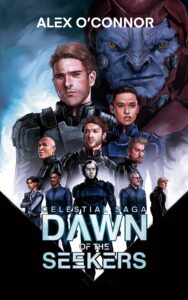
Status: CUT.
Consensus: Our judges loved the passion for special forces tales on clear display in this one, but they felt the narrative tended to provide too much detail, with a proliferation of perspective characters and matter-of-the-fact backstory segments throwing off the pacing and distracting from the central plot.
What Swims on Uncharted World 550 by R.B. Lovitt
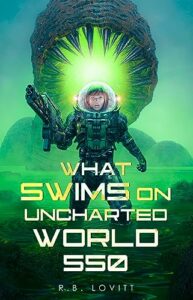
Status: CUT.
Consensus: Our first split decision of the year, as the classic mystery setup provided a quick hook, and our readers found the narrative easy to devour in large gulps. But like many mysteries, it relies heavily on the ending, and our judges found the climax inadequately supported by what had come before.
The Correct Order by Trish Taylor
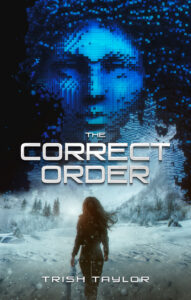
Status: CUT.
Consensus: Our judges were impressed at the ability to handle difficult sociopolitical themes without coming across as shallow or cartoonish, but the character voices too often ran together, and the story struggled to sustain a strong start into the tale’s second half.
Cage of Bone by David Dvorkin
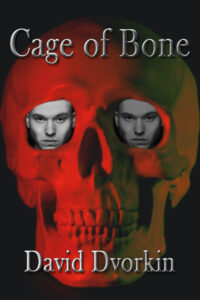
Status: CUT.
Consensus: Our judges found the writing style professional and easy to read, but the story spent little time engaging in the psychological fallout of the lead character’s ability to glimpse into violent minds. Combine that with no overarching conflict in the early stages of the book, and it had our readers wanting something more to grab our attention.
Company Assassin by Claudia Blood
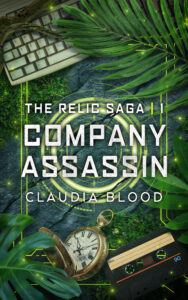
Status: CUT.
Consensus: The harsh setting in which orphans had to band together for survival caught our judges’ attention, but they found the prose didn’t lend itself to really immersing in the story, leaving them struggling to sink into a reading rhythm.
The Faithless and the Damned by Sev Romero
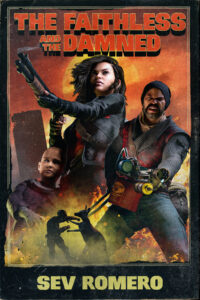
Status: CUT.
Consensus: Both readers were drawn in by the apocalyptic setting rife with political violence, but they were split on the prose, with one reader finding it difficult to immerse and wishing for a more thorough edit, while the other found the storytelling natural and free-flowing. Unfortunately, the reader who enjoyed the prose struggled with the frenetic, thriller-style pacing and the tendency for the secondary characters to spend much of their time monologuing about politics.
Rebellious Nature by Rho Diehl

Status: CUT.
Consensus: Our readers were intrigued by the mystery and found the characters believably flawed, but they had increasing difficulty immersing in the narrative as the story progressed, with a tendency to overattribute dialogue and a bit more telling than showing keeping them at an emotional distance.
